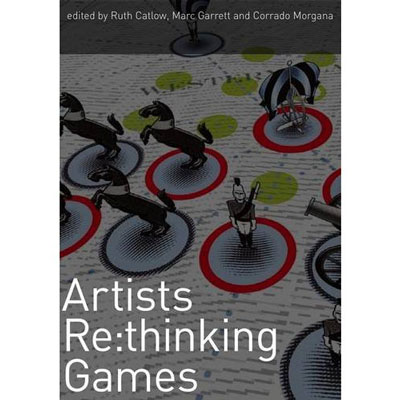Review: Artists Re:thinking Games
24 Sep 2011
Artists Re:thinking Games
Edited by Ruth Catlow, Marc Garrett and Corrado Morgana
FACT/Furtherfield Press
Publisher: Liverpool University Press (October 15, 2010)
ISBN-10: 1846312477
ISBN-13: 978-1846312472

ARTISTS RE:THINKNG GAMES IS A BOOK THAT CHRONICLES A collection of artworks that base themselves around the central notion of games as art. This book has been reviewed by many, but I have attempted to focus on the legendary Situationist International and its continued influence on the thoughts and actions of contemporary writers. The book is a self-conscious attempt to infuse contemporary thinking about games with the broader philosophical and political aims of the Situationists It is comprised of interviews with artists along with descriptions of their work.
Challenged here are the norms and expectations of both the art world and the game culture together. Both are fused, intermixed, and reformulated anew. Neither artworld, nor gamespace, this new terrain is part political, part aesthetic/cultural and part game industry. Homo Ludens, as Huizinga described him, has stepped from the "magic circle" of the playfield and into realms considered previously to be separate from, and largely indifferent to that of commercial popular games. Today all of life is a game. The big bankers and movers and shakers seek to recruit a very reluctant games population to help it 'gamify' their aims and objectives. Chiding commercial games developer professionals, who had invited him to deliver the keynote at the GDC conference in Austin recently, Bruce Sterling dismissed their claims to originality. "The banks will turn your games into their front end!!" he declared. So true. So books like this, that frame game making in new contexts that hopefully bypass the impasse that faces the game maker are welcome indeed.
Molly Hankwitz and I visited Furtherfield's HTTP Gallery in London in January this year and were delighted to find an operation with both hands on the steering wheel of the future and the present together. A kind of British Artists Television Access, with an emphasis upon DIY hacking, computer recycling, digital aesthetics, net.art, and Marxist praxis is what they are about and books like this are typical of the projects they are part of. See:
Included in the book are well written and insightful entries relating to the work of: Jeremy Baily, Ruth Catlow, Heather Corcoran, Daphne Dragona, Mary Flanagan, Mathius Fuchs, Alex Galloway, Marc Garret, Corrado Morgana, Anne-Marie Shleiner, David Surman, Tale of Tales, Bill Viola and Emma Westecott.
Of particular interest to me was the interview with Alex Galloway about his digital version of Guy Debord's game "The Game of War". Describing the game as not a 'detournement' (because 'detourning Debord is a contradiction in terms' - would Debord agree?) Galloway argues his aim, along with that of his collaborators, was to resurrect a 'lost' game. Original copies of "The Art of War" are very difficult to find, but the digital version has enabled groups to play it in ways not possible in the analog, board-and-pieces world.
The game, originally aimed at being a kind of revolutionary version of 'monopoly' works as a metaphor for class war, using Napoleon-era strategy.
Galloway: "We have mimicked Debord's combat mechanic as precisely as we know how, based on the written rules of the game that he provided..."In turning Debord's board game into a videogame, the depiction of such aspects as 'lines of communication' become explicit, and the 'nontrivial arithmetic' calculations at work when attacking are automated using the computer.
This is a fascinating interview, and one which speaks to how the digital era can 'converse' with the ideas of the S.I. in dynamic, interesting and useful ways. Adapting the often cryptic Debordian artefacts of game, game theory and praxis into the digital realm is no mean feat, and one whose time has come. For ours is a world replete with game versions of everything. Ken Wark's recent book The Beach Beneath the Street [also reviewed in this issue of the Otherzine] proposed the phrase "Never Play!" as an adjunct to the well known Debord graffiti "Never Work!". Why? Because today, even play has been subsumed to the global totality that banalizes all, even the ludic urges of the everyman.
For more information on RSG games - visit:
http://r-s-g.orgAnother great entry in the book is an article by David Surman called "Everyday Hacks: Why Cheating Matters". Surman argues that "cheating is hacking for the masses". In a world where mastery of games and mastery of knowledge of games is a form of social capital, the impulse to cheat bespeaks a desire to get behind the workings of the game to the essence of the experience within. Cheat codes, unofficial backdoors and other unauthorized access to the world of games thus represents a way by which the population can engage with ludic space in such as way as to make it more their own, and less an alienating spectacularization of the everyday.
On the whole Artists Re:thinking Games is an excellent book for those interested in seeing how, in the UK at least, writers, artists, hackers and gamers are starting to think and act critically to create a new space in which games and game concepts help fuel a brave new landscape of possibility.
*
For more writings by David Cox:
http://www.davidalbertcox.com